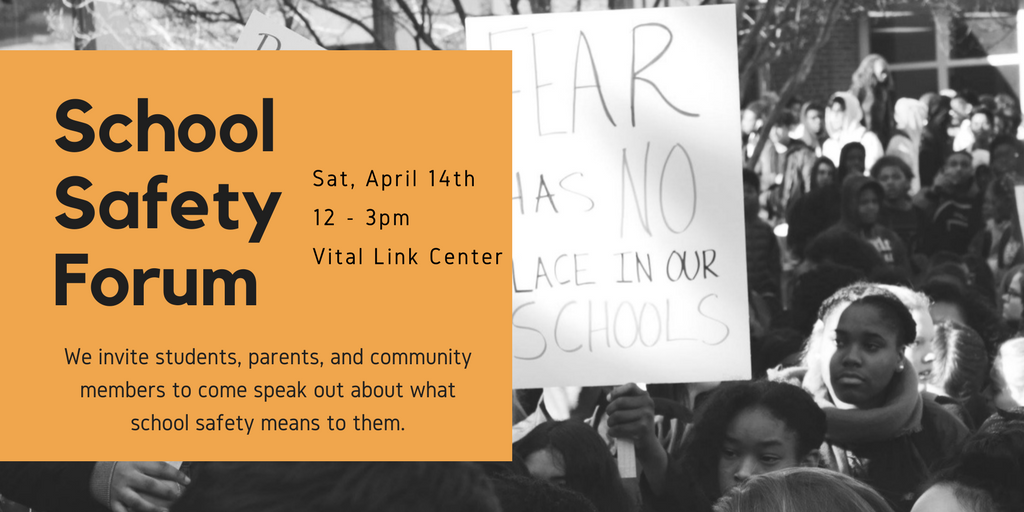
On April 14, 2018, students, parents and community members attended the School Safety Forum. This forum was organized by the Youth Organizing Institute, Education Justice Alliance and Youth Justice Project.
This forum was convened as a response to the Parkland Massacre and the ongoing conversation on safety in schools. On March 21, 2018 the NC House Select Committee on School Safety met and heard testimony from “experts” on the issue of school safety and violence in schools. However, the “experts” that were brought in to testify on school safety did not offer solutions that represented the experiences of all students, especially students of color, LGBTQ and immigrant students. The meeting started at 9am and went until 6pm, which did not give the opportunity for students or parents to attend and give testimony. The few parents that attended the comment section of the meeting did not represent the point of view or experiences of all parents in NC.
We convened the School Safety Forum to make sure that students and parents were heard and gave input as to the best solutions to school violence and school safety. The real experts in this conversation, being the students, were able to speak up and talk about their safety and proposed solutions to end violence in their schools.
We began the forum by talking about the Criminalization of young people, the school to prison pipeline, and unjust and cruel suspension policies in NC. We opened the floor to students to speak up and talk about their current school safety, how they felt about the proposed solutions and to give solutions that benefitted them and made the students feel safer. We also talked about the militarization of schools and the current proposals to arm teachers, increase School Resource Officer Presence, and gun control.
The Forum ended with the proposal of solutions to school violence and how to make schools safer for students. Below are the solutions that the students and parents proposed.
Solutions
- School and Community Based Restorative Justice Programs
- Increased participation of parents and guardians at school events
- This means better access for parents to school (Better times)
- Better communication regarding school events
- Increased access to mental health services
- This means more counselors in school
- Better training for counselors to deal with mental health issues
- Increase Bully Prevention Programs
- Increased Counselor presence at schools
- Current number is at approximately 1 counselor for every 200 students
- Increased funding for counselors at school
- Culturally competency training for counselors
- Increase number of POC Counselors
- Allow students to choose counselors who can relate with student’s experiences
- Reduce testing work loads of counselors so they can be available for students
- No Cops/SRO’s at school
- Students do not fell safer when cops are at school
- Especially students of color, given the past, current and ongoing racial profiling and violence by cops in their communities.
- Decrease/eliminate funding for cops in schools and reroute those funds to better counseling services at schools.
- Increased access to Data on SRO interactions with students
- Disaggregated by race
- If there is no data, then requesting that SROs and Local Law Enforcement begin a process to collect data.
- Cultural competency training
- For teachers, principals, counselors and SROs.
- Trauma Informed Training
- Ensure that counselors and teachers are trained to deal with trauma or with students who have some form of PTSD or experienced trauma in their lives.
- Formation of a group/taskforce led by students of color
- This group would focus on opening a space for students to talk about safety and violence in their schools
- Will give students an opportunity to discuss things that are happening at school and plan events to bring awareness to safety, violence or issues for students of color
The students and parents proposed that the School Safety Forum reconvene in the month of May to continue the conversation and bring in more students and parents to testify and create solutions and proposals that can be taken to the House Select Committee, Schools, and schools boards.
